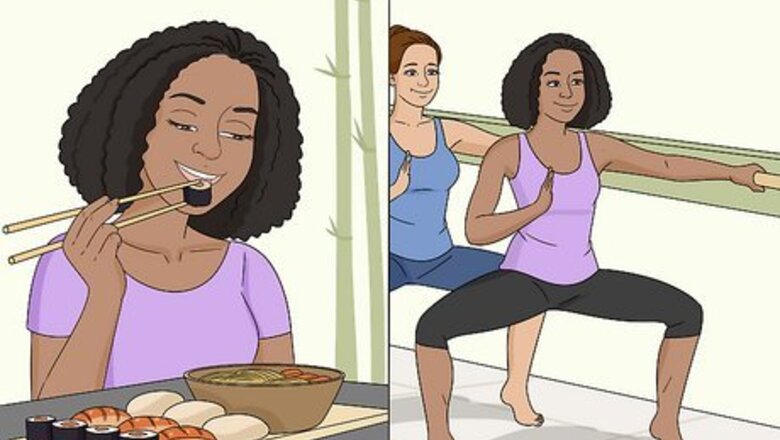
views
- Trying new things, switching up your routine, conversing with people from different walks of life, and reading more can all help you become more open-minded.
- Being open-minded means that you’re receptive to different ideas or opinions, and that you’re willing to see things from other people’s perspectives.[1]
- This can lead to personal growth and better relationships with others. It also helps keep your brain alert and active.[2]
11 Ways to Become More Open Minded
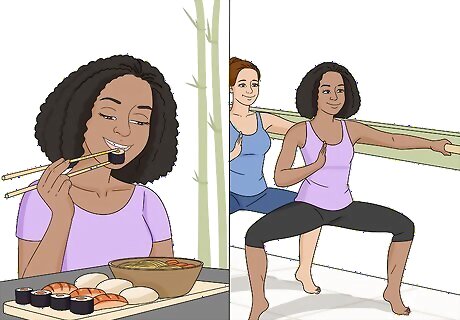
Mix up your routine. Shaking up your daily ritual can help you cultivate open-mindedness. “We get so stuck in the same routine that we always follow the same path,” says Rachel Clissold, a Life Coach and Consultant based in Sydney, Australia. “So it could be as simple as taking a five minute longer journey to work to go the scenic route, going to a different café, trying a different food, joining the gym.” Have you never checked out that new restaurant in town because you don’t know what it’s like there? Now’s the time to check it out. Have you avoided signing up for that English class you’re interested in because you don’t know anything about Romantic poetry? Go for it. Have you avoided the Barre classes at your yoga studio because you’re afraid you won’t know what you’re doing? Take a beginner’s class to dip your feet in.

Be willing to try new things. Keep an open mind about things you’ve never done before. Close-minded people are famous for forming negative opinions of things they’ve never even tried. They may think veganism is completely silly without ever trying it themselves, for example. So, the next time you catch yourself espousing a negative opinion about something, ask yourself what evidence you have to support your ideas. Try researching a subject to learn more about it. If, for example, you aren’t sure why people are vegans, try searching online or checking out a book about it. If you find that there is absolutely no evidence to prove your case, then you should try that thing yourself before you say anything else.
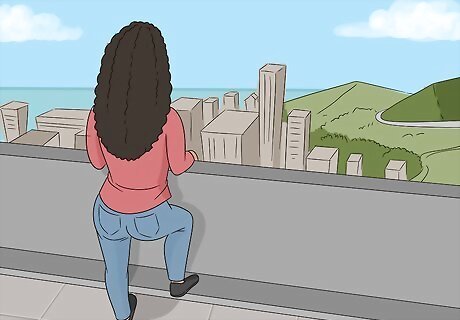
Get out of your comfort zone. Pick something you’re afraid of and try it out. Maybe you’re afraid of heights. Go stand on the roof of a building (if it’s allowed). Afraid of meeting new people? Go to a singles’ mixer or a meet-and-greet in your town. Make a habit of stepping out of your comfort zone as often as you can and you’ll slowly feel your mind opening up. Sandra Possing, a Life Coach based in the San Francisco Bay area, explains that many people are hesitant to try new things because they want to have everything completely planned out. “I love to challenge them to let go of that perfectionist need, that over-analyzer, over-thinker tendency and challenge them to just take imperfect action,” she says. This then leads to a “really active exploration where they’re willing to try things without being so analytical and having to have it all figured out.”
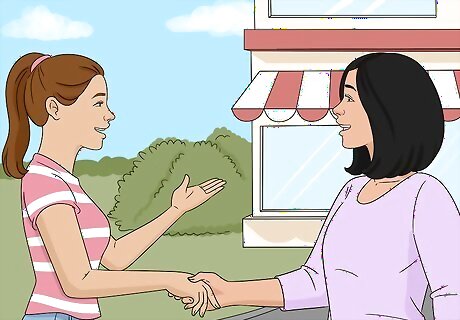
Accept more invitations. Though you don’t have to say yes to every invitation, you can make a habit of saying yes 50% more. It could be a potluck at your neighbor’s house, your aunt’s yearly barbecue that you always skip, or even a poetry reading your friend has been trying to get you to go to for months. Exposing yourself to a wide variety of events will make you more open-minded. Try to accept invitations to different types of events. Just saying yes to party invitations may not necessarily broaden your horizons if you say no to everything else. The next time you say no to something, ask yourself what lies behind this impulse: is it a fear of the unknown? An unwillingness to step out of your comfort zone? Once you identify the reason behind your hesitance, you'll be able to face it and fight it.

Work on seeing things from multiple perspectives. Acknowledge that other people have opinions too. You could do this with almost anything in your life: politics, religion, education, personal beliefs, etc. You don’t have to change your mind or bend any of your morals, but try to see things from the other side. You’ll become more open-minded and learn how to put yourself in someone else’s shoes. Let’s say you’re a very devout Christian. Can you try reading up on other religions, or understanding the reasons why someone might not believe in God at all? Make a list of these reasons and see if it makes it easier for you to understand differing perspectives. This doesn’t mean you have to change your mind, but it will help you have a more open-minded outlook.

Get to know people before making any judgments about them. Pre-judging someone can close off a relationship before it starts. Try to keep your opinion neutral until you actually chat with someone and get to know them more. Even if you’ve heard about them from a friend, you don’t actually know much about them until you talk to them yourself. The next time you meet a new person, try to really understand where they’re coming from before you form any kind of an opinion. If they talk loudly, maybe they’re used to being ignored or looked over. If they seem standoffish, they might just be anxious or shy. When you’re meeting a friend of a friend, try to see it like this: if your friend likes this person, then there must be something good about them. Try to seek it out.
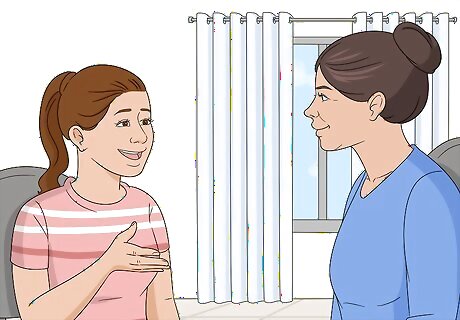
Ask lots of questions and learn something new from everyone you meet. You can do this with an old friend or someone you’ve never met before. Ask them what they’ve been up to, if they’ve read anything good lately, or how their last vacation was. The more interested you are in other people’s lives, the more you’ll learn from them. If you know the person well, ask them about what their childhood was like. You may hear some really interesting details and will learn something new. For example, you might ask, “How are your parents doing?” “How’s the city life treating you?” “What do you do for fun?” “Did you like growing up around here?”
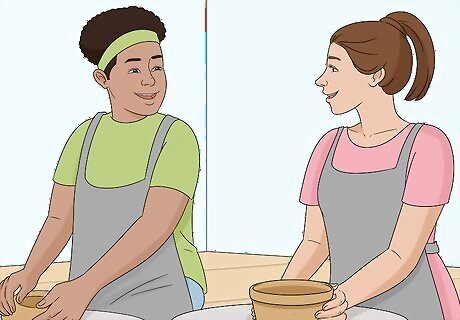
Make friends with people from different walks of life. Broaden your friendship horizons to get different perspectives. It’s fine to keep your close friends that you’ve known for 10 years, but you should also try to branch out a little. Make friends from work, your ceramics class, your favorite neighborhood bar, or from different classes in school as well. Though you shouldn’t hand pick your friends based on their diversity, try to hang out with people that have a variety of jobs, interests, and backgrounds.

Challenge yourself to read more. Pick a variety of things to read and just dive in. You should read widely: non-fiction, literary fiction, magazines, newspapers, blogs, or anything in between. Read a book about a country you’ve never been to, or a book about a political movement you don’t know much about. The more you know, the more power you’ll have to make educated decisions and to be more open-minded. Start a Goodreads account and try to tackle at least 3 books a month. See what other people are reading and get inspired. Spend hours at a bookshop or the library perusing the shelves until you find a book that speaks out to you. Then, make a goal of finishing it by the weekend. Join a book club by looking for one online or in your area. This will make you even more open to a wide variety of literature and will expose you to a number of new opinions.

Travel as much as you can. Try to make a habit of traveling when you’re financially able to. This exposes your mind to new experiences and cultures, which is key to being open-minded.So go look at the Mayan ruins in Mexico, check out the plethora of museums in Paris, or spend a weekend in Montreal. You'll have an amazing time while also broadening your perspective! If you don't have a very large travel budget, you can even take a day trip to a fun destination just a few hours away from your hometown to learn something new. Or, if you can’t afford to travel, try watching the Travel Network, or reading books about different areas of the world. This will broaden your perspectives, too!
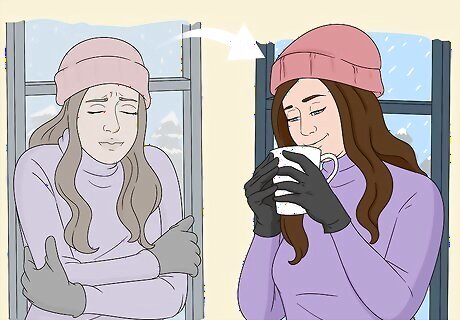
Try to cultivate a positive mindset. Many close-minded people view things in a negative light, while open-minded people tend to be more positive. Sandra Possing recommends keeping a thought log to change a negative mindset. “Every time you write down an unhelpful thought, also write down a different thought you could be thinking instead,” she says. For example, let’s say you catch yourself thinking, “It’s freezing today. This weather sucks.” Can you think of anything good about the cold day? Instead, try: “But there’s nothing like drinking a pumpkin spice latte in your favorite café when it’s cold outside.” Or: “Maybe it’ll snow later. I love snow.” You can find the good in almost any situation. Maybe you hate your 2-hour commute, but you love the alone time you get to listen to your favorite audiobook. Expert Answer Q What if I'm struggling to be more open minded? Rachel Clissold Rachel Clissold Certified Life Coach Rachel Clissold is a Life Coach and Consultant in Sydney, Australia. With over six years of coaching experience and over 17 years of corporate training, Rachel specializes in helping business leaders move through internal roadblocks, gain more freedom and clarity, and optimize their company’s efficiency and productivity. Rachel uses a wide range of techniques including coaching, intuitive guidance, neuro-linguistic programming, and holistic biohacking to help clients overcome fear, break through limitations, and bring their epic visions to life. Rachel is an acclaimed Reiki Master Practitioner, Qualified practitioner in NLP, EFT, Hypnosis & Past Life Regression. She has created events with up to 500 people around Australia, United Kingdom, Bali, and Costa Rica. Rachel Clissold EXPERT ADVICE Answer from Rachel Clissold: Your energy translates into your actions. So, if you're rushing out of the door, that feeling of being rushed is going to follow you out of the door. Try slowing down, taking a deep breath, and remind yourself that you're making an active effort to be more open-minded.
What does being open-minded mean?

Being open-minded means that you’re receptive to new ideas. When someone is an open-minded person, they’re able to see things from other people’s perspectives, and they approach new information with curiosity and a willingness to learn. They’re also more willing to try new things and seek out new experiences. Close minded people, on the other hand, are less willing to consider unfamiliar ideas, and they’re more resistant to trying new things.

Common characteristics of open-minded people include: Able to challenge their own beliefs, admit when they’re wrong, and revise their viewpoints Willing to consider other people’s ideas and opinions, even when they’re very different from their own Excited and curious about trying new things and learning new information, rather than being resistant to these things Able to connect and cooperate with a wide range of people Creative, flexible, and adaptable
Why does being open-minded matter?
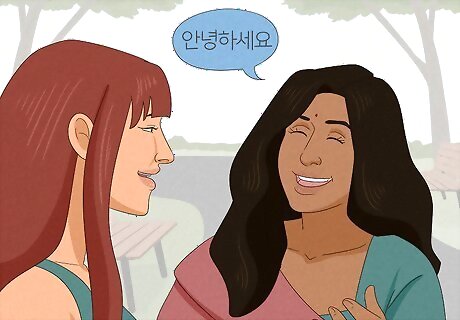
Being open-minded has positive effects on your wellbeing. In fact, studies show that being open to new experiences helps keep your brain alert and active, which then helps preserve your mental faculties in old age. Open-mindedness can also lead to personal growth, optimism, increased ability to empathize with others, and increased capacity to manage uncertainty. Open-mindedness leads to better relationships with people because you’re more willing to see things from others’ perspectives and understand different viewpoints. This leads to deeper, more harmonious connections with the people you meet, even if they come from very different backgrounds or hold very different opinions from you.


















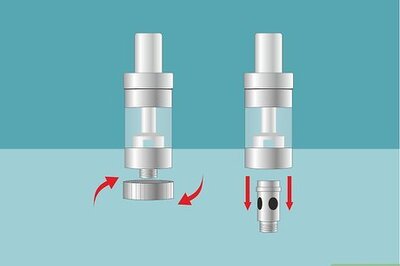
Comments
0 comment